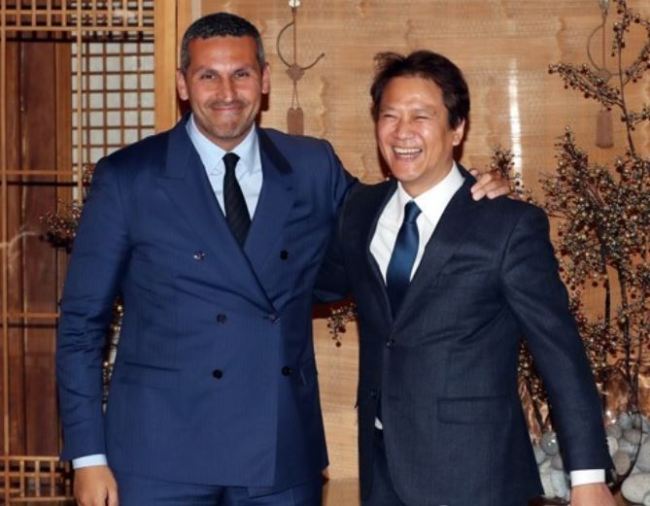South Korea, UAE vow to bolster ties amid controversy over secret military pacts
By Yeo Jun-sukPublished : Jan. 9, 2018 - 16:12
Amid escalating controversy over secret military pacts between South Korea and the UAE that allegedly commit Korean troops to the Middle Eastern country in a contingency, the two countries Tuesday pledged to bolster bilateral ties, elevating their relationship to a comprehensive strategic partnership.
“I hope our relationship will become something between brothers,” said President Moon Jae-in during a meeting with Khaldoon Khalifa al-Mubarak, chairman of the Executive Affairs Authority of Abu Dhabi, at the Blue House on Tuesday.
According to Cheong Wa Dae spokesperson Park Soo-hyun, al-Mubarak relayed a letter from Abu Dhabi Crown Prince Mohammed bin Zayed Al Nahyan and invited Moon to visit one of the nuclear reactors South Korea is constructing in the UAE. Moon accepted the offer, Cheong Wa Dae said.
The two countries also agreed to open high-level dialogues on military and diplomacy issues between the two countries’ defense and foreign ministries.
The meeting came just hours after al-Mubarak’s meeting with presidential chief of staff Im Jong-seok, whose visit to the UAE in December sparked controversy over whether the trip was aimed at resolving bilateral disputes concerning a secret military pact signed during the Lee Myung-bak administration.
“I hope our relationship will become something between brothers,” said President Moon Jae-in during a meeting with Khaldoon Khalifa al-Mubarak, chairman of the Executive Affairs Authority of Abu Dhabi, at the Blue House on Tuesday.
According to Cheong Wa Dae spokesperson Park Soo-hyun, al-Mubarak relayed a letter from Abu Dhabi Crown Prince Mohammed bin Zayed Al Nahyan and invited Moon to visit one of the nuclear reactors South Korea is constructing in the UAE. Moon accepted the offer, Cheong Wa Dae said.
The two countries also agreed to open high-level dialogues on military and diplomacy issues between the two countries’ defense and foreign ministries.
The meeting came just hours after al-Mubarak’s meeting with presidential chief of staff Im Jong-seok, whose visit to the UAE in December sparked controversy over whether the trip was aimed at resolving bilateral disputes concerning a secret military pact signed during the Lee Myung-bak administration.

The controversy further escalated after former Defense Minister Kim Tae-young revealed that the two countries had signed a secret military pact mandating South Korea dispatch its troops to the UAE in the event of a contingency.
Kim, who served from 2009 to 2010 during the Lee Myung-bak administration, acknowledged that the Lee administration had promised military support to the UAE in exchange for the export of four nuclear reactors.
“It was basically about having South Korean troops come to the UAE when it was in military trouble,” Kim said in an interview with local daily JoongAng Ilbo. “During peacetime, it was about helping with UAE’s military training and weapons management.”
The Lee administration signed four military pacts with the UAE after South Korea was awarded a contract to construct four nuclear reactors in 2009. The pacts were neither ratified by the National Assembly nor revealed to the public until late 2010. Details of the pacts remain classified.
Kim’s revelation sparked criticism that the Lee administration should have sought parliamentary approval before signing the pacts, as those documents carry the risk of involving South Korea in conflicts in the Middle East, particularly those between Sunni and Shi’ite Muslims.
The UAE is among the Sunni nations that feel threatened by the increased regional influence of Shi’ite-led Iran, one of South Korea’s main sources of crude oil.
Asked why the Lee administration chose not to pursue parliamentary ratification, former Defense Minister Kim said the government decided to shelve the process until South Korea faced a situation where it had to send troops to the UAE.
“Let’s put it this way. We decided to become close with the UAE -- as close as between brothers -- and help them when they are in trouble. But if we were really in a situation where we were going to send our troops to the UAE, we couldn’t send them without parliamentary approval.”
The controversy shows no sign of abating as liberal lawmakers criticized the previous Lee administration for signing controversial military agreements behind the scenes without consideration of diplomatic repercussions.
Rep. Kim Jong-dae of minor opposition Justice Party said that the agreement was tantamount to the “mutual defense treaty” between South Korea and the US and that Seoul’s Special Forces dispatched there would become a “trip wire” that forces Seoul into military conflicts.
In return for winning a contract for four nuclear reactors, the Lee administration dispatched in 2011 a 130-strong Special Forces unit, named Ahk, to help train local troops in anti-terrorism as well as to conduct joint drills.
“(The Lee administration) was trying to become a brother country without telling the people” Kim said in an interview with a local broadcaster Tuesday. “I think it was the first time in history that we agreed to sign a mutual protection agreement to protect another country.”
The United States is the only country with which South Korea has signed a mutual defense treaty. The agreement was signed in October 1953, months after the signing of the armistice agreement that brought a halt to the 1950-1953 Korean War.
By Yeo Jun-suk (jasonyeo@heraldcorp.com)





![[KH Explains] No more 'Michael' at Kakao Games](http://res.heraldm.com/phpwas/restmb_idxmake.php?idx=644&simg=/content/image/2024/04/28/20240428050183_0.jpg&u=20240428180321)












![[Herald Interview] Mistakes turn into blessings in street performance, director says](http://res.heraldm.com/phpwas/restmb_idxmake.php?idx=652&simg=/content/image/2024/04/28/20240428050150_0.jpg&u=20240428174656)
